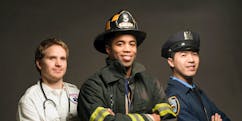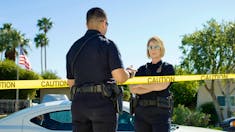How to Pass the CritiCall Test in 2026
Updated November 5, 2024
The call could be someone trapped in a house with an intruder. It could be someone confessing to a murder. It could be a kidnapping, a fire, a car accident, a road flooding or a domestic dispute.
There are probably a million different scenarios that could come to you over the phone on any given shift, and it is up to you to send the appropriate help in a quick, calm manner.
This is the life of a 911 dispatcher.
911 call dispatchers deal with life-threatening scenarios during their shifts. They need to know what type of help to send and where to send it, while remaining calm and thinking quickly.
They need to be able to summarize information quickly and communicate with the caller.
If this high-adrenaline job appeals to you, then you need to know how to pass the CritiCall Test.
What Is the CritiCall Test and What Is its Purpose?
The CritiCall Test assesses if an applicant has the basic skills to be a 911 dispatcher.
The job of a 911 dispatcher is one of great importance to the community. Dispatchers make quick decisions all day and night that affect the safety and security of those who live in that community.
The test measures the skills and qualities needed for the dispatcher job. It looks at people’s ability to make decisions in the moment, summarize calls and communicate quickly and clearly.
The CritiCall Test consists of up to 23 modules. Candidates are assessed with the modules that are relevant to their desired position.
The most common modules used are:
- Decision-making and multi-tasking
- Memorization
- Data entry
- Map reading
The test also looks at:
- Short and long-term memory
- Multi-tasking
- Reading comprehension
- Spelling, grammar and clarity
- Numerical ability
The aim of the test is to find applicants with the skills and abilities to meet the needs of the job. Those who can think and act on their feet quickly are highly desired.
CritiCall Test Question Types
Typical CritiCall examinations follow the same pattern with three groups of questions. The questions may vary depending on the exact position the candidate is interested in.
Candidates will be presented with a variety of situations and judged on their ability to respond quickly and calmly.
Attention to Detail
Data Entry and Multi-Tasking
Using a simulated dispatch system, candidates must enter information such as names, phones numbers, dates, addresses, etc.
They must also complete the same test with audio questions in the form of simulated 911 calls.
To pass this section, applicants must achieve 60 keystrokes per minute on data entry and multi-tasking, 28 keystrokes per minute on audio data entry with multi-tasking and 35 words per minute on keyboarding.
Sample question:
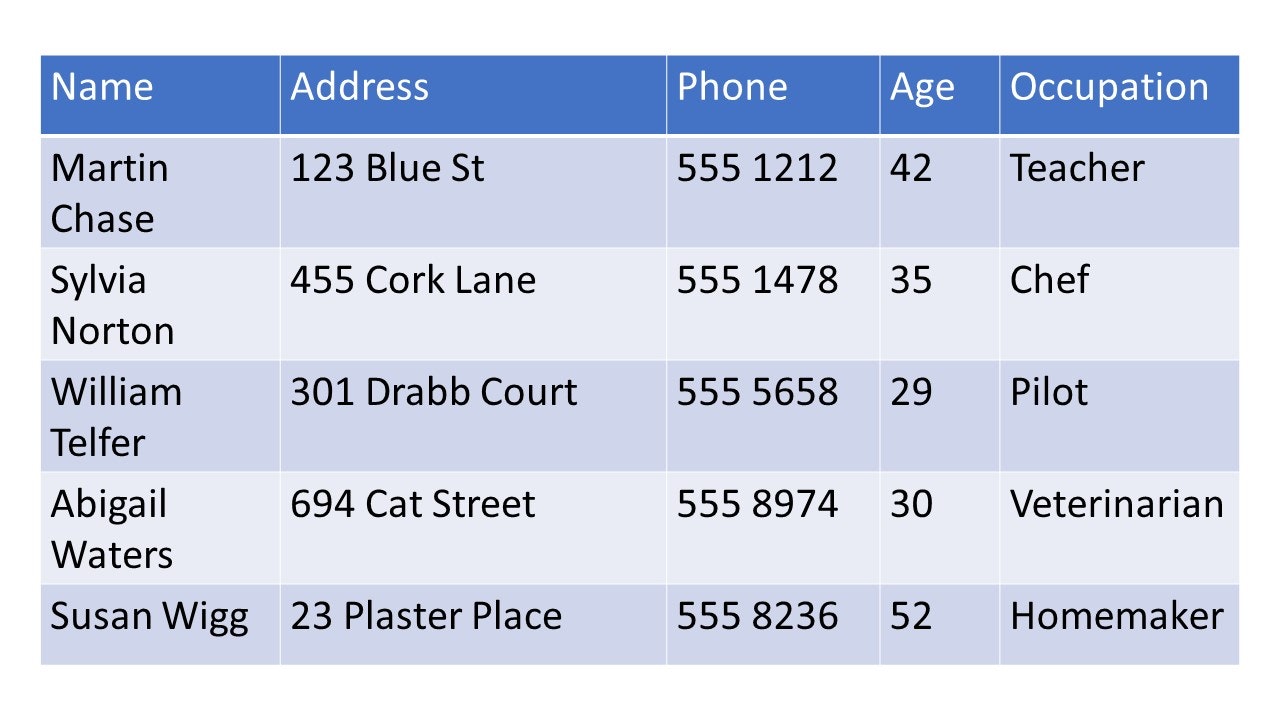
You have a table of information in front of you that you must enter into the system quickly.
Only looking at the information once, and then looking away, answer the following questions:
- Who lives at 301 Drabb Court?
- Who has the phone number 555 8974?
- What is Susan Wigg’s address?
Practice CritiCall Test with JobTestPrep
Character Comparison
Candidates are given two tables of similar information and are required to look through them carefully to find any differences. A passing mark for this exercise is 70%.
Sample question:
Find the differences in the tables of information.
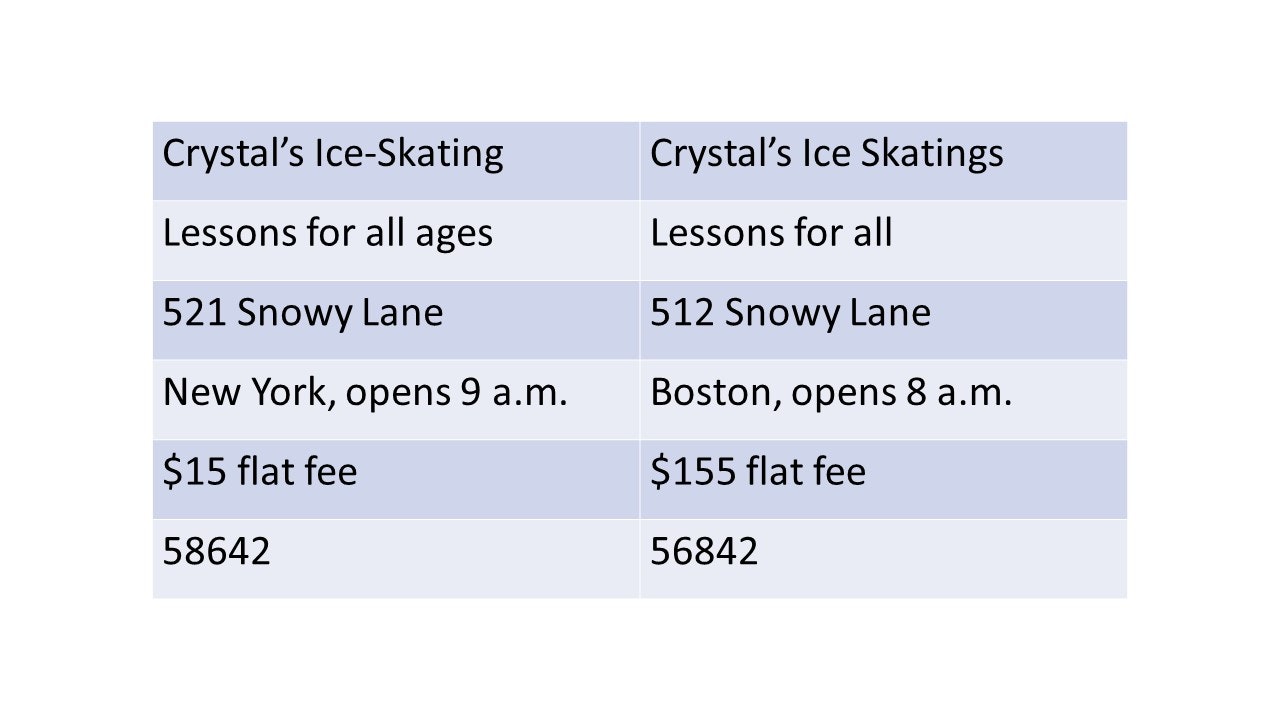
Cross Referencing
Candidates need to show they can read address books and quickly locate a position, then record requested information accurately.
Candidates must also enter presented data verbally.
The pass mark for these tests is 70%.
Sample question:
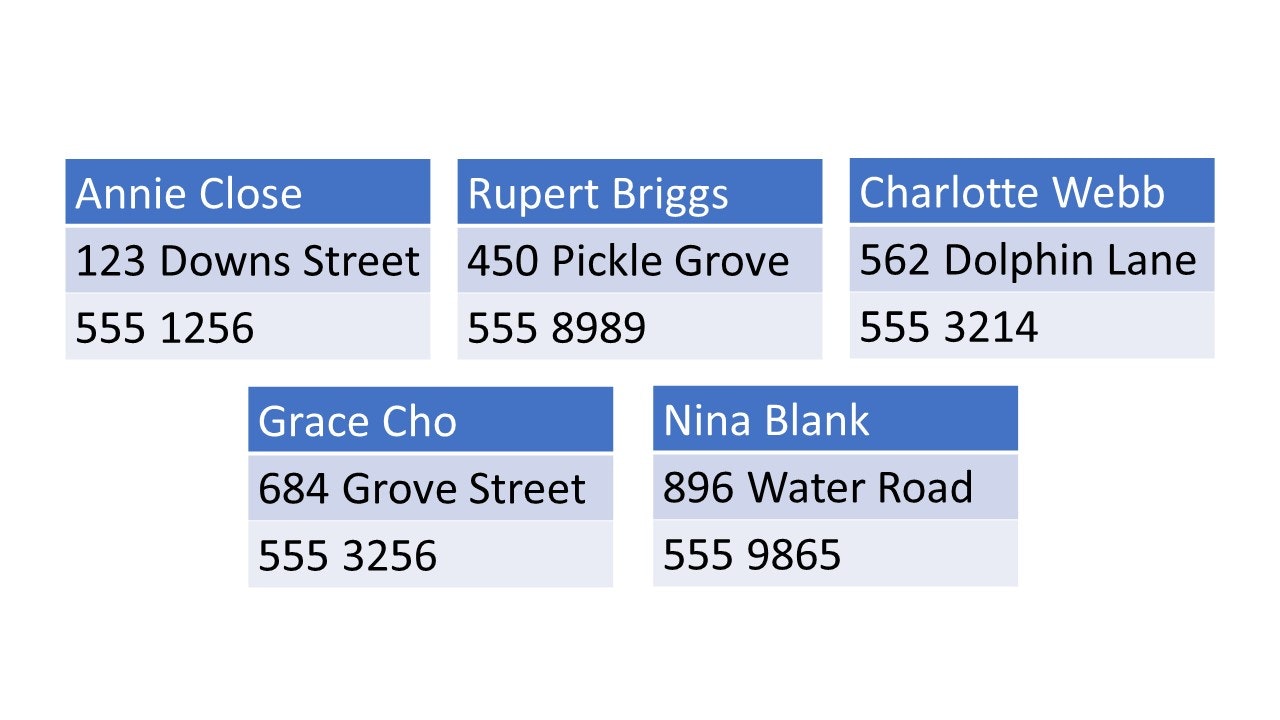
Using the five address book entries above, answer the questions:
1. What is the address for Rupert Briggs?
2. What is Charlotte’s last name?
3. Who has the phone number 555 1256?
Dispatcher Skills
Prioritization
911 dispatchers take many calls during their shift and prioritizing incidents as they occur is a key part of the job. Candidates will be given several situations and asked to rank them in order of response priority.
The pass mark is 70%.
According to TSA Test Prep, the order in which calls should be prioritized is as follows:
- Loss of life or serious injury
- Sexual assault of a serious nature
- Property loss of a serious nature
- Injuries which do not include an immediate life loss
- Minor property loss
- Non-emergency calls which report a crime
- Non-emergency calls which do not report a crime
Sample question:
Below are five calls that have come in, almost at the same time. Rank them from 1 to 5 in the order you would respond to them.
A) A father calls to say his boy has fallen off his skateboard and cannot stand on his foot.
B) A woman calls, frantic that she is in her locked bathroom and hears someone moving around in her house. She lives alone.
C) A woman calls in that she thinks she can see smoke coming from her neighbours’ home. She does not know if anyone is at home.
D) A tree branch has fallen on North Maple Street and landed on a car, no occupants in the car.
E) A man has called to say he has been rear-ended. Both drivers are fine and have moved the cars off the road.
If you need to prepare for a number of different employment tests and want to outsmart the competition, choose a Premium Membership from JobTestPrep.
You will get access to three PrepPacks of your choice, from a database that covers all the major test providers and employers and tailored profession packs.
Decision Making
There are several service options that a 911 dispatcher can send to a situation. Police, fire and ambulance are a few. It can be a waste of time and money to send the wrong service, so this test gives candidates a series of questions, asking them to determine which emergency service to send to an incident.
Candidates will be tested verbally as well as via a written test.
It is important for candidates to note the following about when to send which emergency service.
Police should be dispatched when:
- Someone is attempting to threaten physical harm towards a person or persons
- Damage to someone’s property has occurred or is in the process of occurring
The Fire Department should be dispatched when:
- There are signs of a fire in progress
- When a fire alarm is going off
- When someone needs to be rescued who is trapped or confused
Emergency Medical Services (EMS) should be dispatched when a person needs medical intervention from a trained medical professional.
Public Utilities should be dispatched when there is a problem with public water systems, electrical power systems, natural gas systems and blocked sewer drain pipes.
Sample questions:
Below are five scenarios. Choose which service you would dispatch; some may involve more than one.
A) There has been a car accident. The driver is injured but their car hit a telephone pole and crackling wires are down.
B) Smoke is coming from a parked car on the street.
C) Children playing got locked in a shed outside the neighbor’s house.
D) Two people have just shoplifted from the local pharmacy and are making a run for it on foot.
E) A woman was hit with a fly baseball in the local park and is not responding to CPR.
Probability
911 dispatchers receive calls from people in extreme stress. They may not receive all of the information needed, or be able to hear the caller clearly. This section will test a candidate’s ability to decipher muffled or incomplete information.
Sample question:
Make your best guess at what the caller below is trying to say:
“Our ar it….ee, on North end of Aple steet… band can’t oove….lood all over. I am inn by…..eet belt. Ees hurry.”
Memory Recall
Candidates are presented with written and audio information that they must memorize and recall later.
The pass mark for this test is 70%.
Sample question:
Below are two scripts of letters and symbols. They are to be memorized and repeated after waiting five minutes:
&VG
(^*&HKJKN%$^&
Map Reading
Despite technological advances that can aid dispatchers with locations, all 911 dispatchers need a good geographical knowledge of their area.
Candidates will use a map to plan the most safe, effective and legal routes for emergency services to take.
Candidates must score 70% to pass.
Basic Skills
Call Summarization
Candidates will need to listen to simulated 911 calls and summarize the information they hear on the computer system. Accuracy and speed are essential for a good score. Candidates are also asked verbal questions about the information heard.
The passing score is 70%.
Sample question:
You have a woman caller reporting an accident, very agitated. She insists they are at the corner of Fletcher Street and Broadway Road. A male voice talking over her insists they are at Chester Street and Broadway Road.
Neither Fletcher nor Chester shows up, but a quick search shows a Foster Street in the vicinity their call is pinging from. Which address do you go with?
Spelling and Sentence Clarity
When people’s lives depend on the accuracy of the 911 dispatcher, mistakes cannot be made. The candidate needs to have a high level of written English as well as accuracy in relating events.
Candidates are tested on the spelling of work vocabulary as well as being able to use the simplest, most concise language to relay a message.
The pass mark is 70%.
Sample questions:
Below are five sentences. Choose the correct word to fill in the blank so that the sentence makes sense.
- The girls donated some of (there, their or they are) time to the food drive.
- The car was going so fast it almost went into the (gorge, gourd).
- Sometimes a big rainstorm can really (affect, effect) the weather.
- People who study hard (know, no) a lot of information.
- It was getting harder to (elicit, illicit) a response from her.
Math
Some basic math is needed during the shift of a 911 dispatcher. You need to be able to keep track of calls, and calculate distances and the number of units responding.
Sample questions:
Dispatcher A has had three calls in the last ten minutes. She has dispatched five vehicles: two police, two EMS and one fire, and has had to reroute two of the vehicles due to construction. She now adds on an additional two calls with two more police dispatched. The two EMS vehicles are en route to the hospital and have gone a quarter of the way of their five miles.
1. How many vehicles in total have been dispatched?
2. How much further do the EMS vehicles have to travel?
Reading Comprehension
Candidates need to be able to read and understand information in manuals, training materials and recorded incoming calls.
The pass mark is 60%.
Sample question:
Read the passage below and summarize the main points.
While the main point of a lockdown is to avoid overwhelming the medical system, we may end up overwhelming it in a different way. Post-COVID, many people will have undiagnosed illnesses, cancers and depression which will then start to weigh on our medical system. People cannot delay health care, even in a pandemic.
CritiCall Preparation Strategies: How to Pass
While the test aims to test a candidate’s abilities rather than memorized knowledge, there are still areas that can be worked on in preparation for the test.
Online Tutorials and Practice Tests
The CritiCall website has a long list of resources to help candidates prepare.
If you want to practice the CritiCall test in real-time, you should visit JobTestPrep for preparation tips and sample questions.
JobTestPrep offers a money-back guarantee if you aren't completely satisfied.
Practice the CritiCall Test with JobTestPrep
Data Entry
Data entry is a major component of a 911 dispatcher’s job. A good place to start practicing is The Data Entry Practice Test.
You can also try some practice data entry at The Police Test Tutor to help improve your speed and data-entry skills.
Touch Typing
There are many online tests to practice your keyboarding skills. Even simply sitting and copying from a book or magazine would help.
Give Office Proficiency Assessment and Certification a try to boost your speed and accuracy.
Understanding Maps
For those who have difficulty with directions, this is an important area to work on as a 911 dispatcher needs to direct emergency services. It can be worthwhile spending some time with Google Maps to create different routes, or directions for friends to follow.
You may even have a friend create some directions for you to follow so you can see what it is like from the other end and get a better understanding of your area.
Role Play
Playing out scenarios with your friends can be a great way to anticipate what you may encounter during the test.
How to Prepare on the Day of the CritiCall Test
The day of any test brings nerves and feelings of anxiety. Keep the following tips in mind and you should stay calm and ready to be tested:
Step 1. Arrive Early
No matter how well you think you know the way to the test centre, circumstances always change. You could encounter an accident, bad weather or traffic congestion. Always give yourself extra time, there is no harm in being early.
Step 2. Eat Before the Test
Your stomach may feel like butterflies have taken flight, but it is important to eat.
Not only does it provide your brain with energy, you do not want to feel hungry during the test and get distracted by your desire to eat.
Step 3. Breathe Calmly
If you get worked up and breathe too fast, you may feel lightheaded. Try to clear your mind and take deep breaths to relax.
Step 4. Give Yourself a Pep Talk
There is nothing wrong with psyching yourself up to do well by giving yourself a pep talk. Reinforce that you know what to do and you are going to do well.
Step 5. Keep Hydrated
Just as you do not want to feel hungry during the test, you also do not want to feel thirsty. It can become distracting and can cause you to feel lightheaded and tired.
Plus, if you do feel hungry, drinking some water can help ease that.
Step 6. Be Well Rested
You may be anxious and want to go over your information again, but it is also important to get to bed at a decent time the night before and have a good sleep. It will make you more awake and help you to think clearly.
The CritiCall test is used to decide whether an applicant has the basic skills to work as a 911 dispatcher.
The questions are designed to find out whether an individual can make fast, safe decisions, summarize information and communicate clearly while working under pressure.
To pass the CritiCall test, you will need to demonstrate that you have the appropriate skills to succeed in the role of a 911 dispatcher.
Relevant skills include short and long-term memory, multi-tasking, reading comprehension, numerical ability and spelling/grammar.
In Data Entry and Multi-Tasking, you will use a simulated dispatch system to enter data.
To pass, you will need to achieve 60 keystrokes per minute for data entry and multi-tasking, 28 keystrokes per minute on audio data entry and multi-tasking and 35 words per minute on keyboarding.
The pass mark for most parts of the test is 70%, however, this is 60% for the Reading Comprehension element.
To prepare for the CritiCall test, it is important to complete as many practice tests as possible. This will help you to become familiar with the format of the test, improve your time management and feel more confident on the day of the test.
It is important to practice skills such as data entry, touch typing and map reading.
You will find many resources online to help you prepare, including a CritiCall preparation pack from JobTestPrep.
Do your best to get a good night’s sleep before the test, eat a nutritious breakfast and arrive at the test venue early.
The CritiCall exam takes approximately two hours to complete, although this is dependent on the test-takers reading and typing speed.
Your CritiCall score will be calculated using three metrics: keystrokes-per-hour (KPH), words-per-minute (WPM) and percentage scores.
A weighted score is calculated, with KPH accounting for 40%, WPM accounting for 20% and percentage scores accounting for 40%.
This means that your test score is based on both correct answers and your ability to answer quickly and accurately.
To read a CritiCall map, you will need to show that you can follow commands including 'left' and 'right' as well as 'North', 'South', 'East' and 'West'.
You will also need to show that you can quickly identify the fastest route between the given points on the map.
You can access several useful CritiCall practice map reading tests on the Police Test Tutor website.
Each employer sets its own passing score for CritiCall tests. On average, the passing score falls somewhere around 70 and 75%.
Conclusion
The life of a 911 call dispatcher can be full of excitement and energy. Every call and every day is different.
You now know how to prepare well for the CritiCall Test, if you have decided this career is for you. Following the steps above should ensure that you do well. Go over all the information carefully and rely on your natural skills.
Remember to relax and answer quickly and calmly and you will soon be helping those in need.



